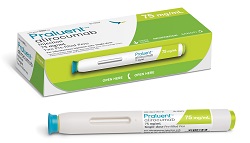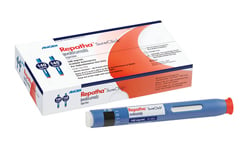 Here's one way to privilege a new drug over its rival without blocking one entirely: Make patients try your favored product first.
Here's one way to privilege a new drug over its rival without blocking one entirely: Make patients try your favored product first.
That's what UnitedHealth's ($UNH) Oxford unit is doing with the two new cholesterol-fighting PCSK9 drugs, Bloomberg reports, citing a policy update. Patients will have to take Sanofi ($SNY) and Regeneron's ($REGN) Praluent first, unless they have a history of reacting badly to it. If Praluent doesn't work after 12 weeks, then they can try Amgen's ($AMGN) competing drug Repatha.
Approved just about a month apart, and priced similarly at about $14,000 per year, the two meds are in a head-to-head battle for patients, and these days, that means a battle for formulary placement and reimbursement. The companies have been negotiating with top insurers and pharmacy benefits managers, and so far, Amgen seems to be in the lead.
Express Scripts ($ESRX), one of the heavyweight PBMs in the U.S., is covering both drugs after winning discounts on both. CVS Health ($CVS), meanwhile, tapped Repatha as its preferred product. Amgen also scored an exclusive with Harvard Pilgrim Health System with a groundbreaking pay-for-performance arrangement.
 With Express Scripts and CVS Health deals sewn up, UnitedHealth and its OptumRx PBM are the biggest accounts left unsigned. Sanofi's edge with UnitedHealth's Oxford business, which covers patients in the Northeast, might be a good sign for the French drugmaker in the race for coverage.
With Express Scripts and CVS Health deals sewn up, UnitedHealth and its OptumRx PBM are the biggest accounts left unsigned. Sanofi's edge with UnitedHealth's Oxford business, which covers patients in the Northeast, might be a good sign for the French drugmaker in the race for coverage.
Overall, PCSK9 use may grow more slowly than some had expected as the two rival meds neared approval. One reason Express Scripts chose to cover both meds is that its prior authorization hurdles are keeping a lid on eligible patient numbers, the PBM says.
Plus, a lack of outcomes data seems to be holding the two back. The cost-effectiveness watchdogs at England's National Institute for Health and Clinical Excellence recently stiff-armed Repatha because there's no proof of a cardiovascular benefit; like Praluent, it was approved on the strength of its ability to lower LDL cholesterol levels, and dramatically, at that.
Meanwhile, the FDA chose to approve both meds with "narrow" labels, limiting their use to people who'd failed to achieve their LDL goals despite intense statin therapy and to patients with a hereditary form of high cholesterol. When outcomes data become available in a few years, the agency may broaden that approval--and give sales a big boost, too.
- get the story from Bloomberg
- see the UnitedHealth policy update (PDF)